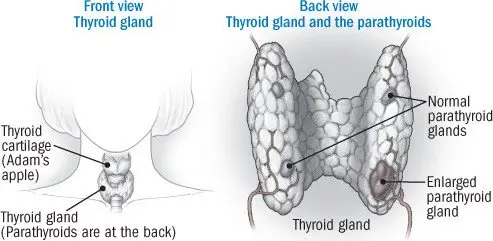What is Hypoparathyroidism?
Hypoparathyroidism is a rare disorder in which the body produces too little or no parathyroid hormone. This hormone, together with vitamin D and another hormone called calcitonin, regulates the amount of calcium in the blood. Hypoparathyroidism can result in an abnormally low level of calcium in the blood, called hypocalcemia.
Parathyroid hormone is produced by the parathyroid glands, four small glands located behind the thyroid gland in the neck.

Doctors classify hypoparathyroidism as either hereditary or acquired. In hereditary hypoparathyroidism, the parathyroid glands are either absent at birth or fail to function properly for some unknown reason. Hereditary hypoparathyroidism sometimes occurs with other developmental defects, or as part of a syndrome that affects the thyroid gland and adrenal cortex. It generally causes symptoms before age 10, although occasionally symptoms will appear later.
Acquired hypoparathyroidism most commonly occurs when the parathyroid glands are removed or damaged during surgery. This can occur during surgery on the thyroid gland to treat hyperthyroidism or a thyroid tumor or during surgery on the parathyroid glands themselves to treat an overproduction of parathyroid hormone (hyperparathyroidism). The acquired hypoparathyroidism is most often temporary. Acquired hypoparathyroidism is less common than it once was because surgeons have recognized the importance of preserving the parathyroid glands during surgery and because nonsurgical treatments for hyperthyroidism have become more common.
Symptoms
The symptoms of hypoparathyroidism result from the low levels of calcium in the body. The most common symptom is muscle cramps or tightness and tingling of the lips or fingers. This condition is known as tetany, which causes twitching and painful spasms in muscles of the face, hands, arms, throat and, sometimes, the feet. Seizures also can occur, but they are rare.
In addition to tetany, symptoms accompanying hereditary hypoparathyroidism can include:
- Hair loss
- Dry skin
- Yeast infection (candidiasis), typically of the fingernails, toenails, skin, mouth (thrush) or vagina
- Poor tooth development in children
- Mental retardation
Diagnosis
Your doctor will ask you about unexplained twitching or spasms of muscles, dry skin, hair loss or yeast infections. In children, your doctor will ask about tooth development and about the timing of developmental milestones (ages at which your child first rolled over, sat up, crawled, walked and spoke).
If you are experiencing symptoms, your doctor will look for muscle spasms, particularly in your face and hands. Your doctor also will check for signs of dry skin, areas of thin hair and yeast infections. Your doctor will confirm a diagnosis of hypoparathyroidism with a blood test to measure your levels of parathyroid hormone, calcium and phosphorus.
Expected Duration
Hypoparathyroidism may be a chronic (long-lasting) condition that requires lifelong treatment with calcium and vitamin D supplements.
Prevention
There is no cure for either hereditary or sustained acquired hypoparathyroidism. With vitamin D therapy and supplemental calcium, most people will have minimal symptoms, if any.
Treatment
Whether it is hereditary or acquired, hypoparathyroidism is treated with calcium and vitamin D supplements to maintain a normal level of calcium in the blood. Vitamin D is necessary because it helps your body to absorb calcium. The supplements may need to be taken for the rest of your life, and your blood must be tested regularly to ensure that proper levels of calcium and vitamin D are being maintained. Regular checkups are important. Episodes of tetany are treated with calcium given intravenously (into a vein), which provides quick relief of symptoms.
Medications called diuretics sometimes are given to prevent too much calcium from being lost through the urine, a problem that can lead to kidney stones. Diuretics will reduce the amount of calcium and vitamin D supplements you need.
Treatment options
The following list of medications are in some way related to or used in the treatment of this condition.
- calcitriol
- Rocaltrol
- Natpara
- Drisdol
- Calciferol
View more treatment options
When To Call a Professional
Call your doctor if you or a family member has painful muscle spasms, particularly in the face, hands, arms or feet; or a pins-and-needles feeling in face, hands or feet. Also call a doctor if a child has the following symptoms:
- Excessive hair loss
- Overly dry skin
- Patches of itchy, red or scaly skin
- Tooth abnormalities
- Delayed developmental milestones
Prognosis
With appropriate treatment, people with hypoparathyroidism can expect to lead an almost normal life.
Additional Info
National Organization for Rare Disorders (NORD)
Fax: 203-798-2291
http://www.rarediseases.org/
Office of Rare Diseases
http://rarediseases.info.nih.gov/




